Qoder Rockets To 100,000 Users In 5 Days, Setting A New Benchmark For AI Coding Growth
Reaching 100,000 users in just five days is more than a vanity metric - it signals a turning point in how the global developer community views AI in coding. While earlier products attracted curiosity, Qoder has demonstrated immediate large-scale adoption, proving its relevance to real engineering workflows.
The surge reflects pent-up demand for tools that address project-wide complexity rather than isolated tasks. Early adopters range from individual developers to enterprise teams, many of whom cite Qoder's holistic approach as the reason for switching. This momentum suggests that the industry is ready to move beyond experimentation and embrace agentic coding as the new foundation for software development.
Repo Wiki: Turning Implicit Knowledge Into Team Assets
One of Qoder's most celebrated innovations is Repo Wiki, a feature designed to make the invisible visible. Software projects often accumulate hidden assumptions-architectural decisions, design rationales, and undocumented dependencies-that remain locked in the minds of individual developers. When those developers leave or projects scale, this implicit knowledge becomes a bottleneck. Repo Wiki directly addresses this issue by automatically generating structured, evolving documentation from source code.
Function display diagram
With its latest release, Repo Wiki introduces powerful new capabilities:
-
Wiki Sharing: When a wiki is generated locally, Qoder creates a dedicated directory inside the code repository. A simple push to Git makes the documentation instantly shareable with teammates, turning knowledge into a collective resource.
Manual Editing: Developers can now edit wiki content directly, adding clarifications or business context. This ensures documentation is not just technically accurate, but also aligned with organizational goals.
Export functionality: Content can be exported in Markdown or PDF, making it easy to integrate into internal knowledge bases, onboarding materials, or handover guides.
Automatic Sync Detection: Qoder continuously monitors for code changes. If the wiki drifts out of alignment, the system proactively prompts for updates, keeping documentation reliable over time.
For many early adopters, this feature has already become the“engineering brain” of their codebase - bridging the gap between raw source files and actionable understanding.
Smart Context Control: Optimize Usage, Save Your Credits
Another standout addition to Qoder is the Smart Context Control, a feature born directly from developer feedback.
At its core, Smart Context Control allows developers to view and manage the active conversation window. When the context grows too large, Qoder intelligently offers the option to“Compact Chat.” This process condenses the conversation into a summarized form that preserves essential facts, decisions, and reasoning, while removing redundant details. The result is a leaner context window that significantly reduces token usage for all subsequent interactions.
Function display diagram
This innovation delivers two major benefits:
-
Cost Efficiency: Developers can extend the life of their credits and avoid unnecessary overhead, especially in large-scale projects that require long-running dialogues with the system.
Sustained Productivity: By summarizing past interactions without losing meaning, Smart Context Control ensures continuity in project discussions, even across lengthy development cycles.
Together, these improvements make Qoder not just powerful, but sustainable. Teams working on enterprise-grade applications can now depend on Qoder for weeks or months at a time without worrying about runaway costs.
Future Outlook
As adoption accelerates, Qoder could set the benchmark for what developers expect from AI coding platforms. The platform is no longer just an assistant; it is emerging as an engineering agent-a reliable partner for the future of software creation.
Industry watchers see Qoder's latest move not just as a gesture of gratitude, but as a signal of strategic ambition. Beginning September 23, 2025, Qoder is offering a 50% discount on its Pro and Pro+ plans, covering both new subscriptions and renewals. Such an aggressive pricing play suggests the company is preparing to accelerate adoption far beyond its current milestone.
Price display diagram
Analysts note that Qoder's expansion of payment options-adding Alipay alongside Visa and MasterCard - further positions it for rapid penetration in Asia and other emerging developer markets. Combined with a two-week free trial and 1,000 credits, the promotion lowers barriers dramatically.
We've included the link here: - feel free to explore, test it, and share your feedback.

Legal Disclaimer:
MENAFN provides the
information “as is” without warranty of any kind. We do not accept
any responsibility or liability for the accuracy, content, images,
videos, licenses, completeness, legality, or reliability of the information
contained in this article. If you have any complaints or copyright
issues related to this article, kindly contact the provider above.
Most popular stories
Market Research

- New Cryptocurrency Mutuum Finance (MUTM) Raises $15.8M As Phase 6 Reaches 40%
- Bydfi Joins Korea Blockchain Week 2025 (KBW2025): Deepening Web3 Engagement
- Yield Basis Nears Mainnet Launch As Curve DAO Votes On Crvusd Proposal
- 0G Labs Launches Aristotle Mainnet With Largest Day-One Ecosystem For Decentralized AI
- Ethereum-Based Defi Crypto Mutuum Finance (MUTM) Raises Over $16 Million With More Than 720M Tokens Sold
- Fintech's Gender Gap In Focus: Drofa Comms' Women Leading The Way Joins Evolvh3r's She Connects At TOKEN2049























Comments
No comment